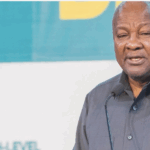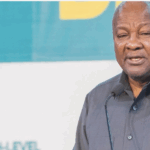
President John Mahama has urged African Union leaders to move beyond rhetoric and take bold, coordinated action to advance justice, reparations, and democratic renewal as the 13th AU High-Level Dialogue ended in Accra.
He warned that Africa could afford to remain trapped in cycles of lofty declarations and symbolic gestures while its citizens, especially the youth, demand real change.
The time, he said, had come for leaders to match words with action and build systems that reflect the continent’s collective aspirations for justice, dignity, and progress.
The President, in a speech read on his behalf by Ambassador Perpetual Dufu, the Coordinating Director for Multilateral and International Organisations at the Ministry of Foreign Affairs, at the closing ceremony of the High-Level Dialogue in Accra, stressed the need for bold leadership grounded in equity, truth, and citizen engagement.
He emphasised that the Dialogue should not conclude with yet another formal declaration but must serve as a meaningful catalyst for action rooted in truth and justice.
The two-day Dialogue, held under the African Union’s 2025 theme “Justice, Rights, Reparations and State Building,” brought together AU officials, representatives from member states, regional bodies, civil society, diaspora communities, and international partners.
Discussions focused on addressing Africa’s enduring governance challenges through the lens of historical justice and structural reform.
President Mahama said the gathering was not about reliving past frustrations, but about building consensus and developing practical strategies to move the continent forward.
He said Africa could no longer afford to be passive in the face of its painful legacy of colonialism, enslavement, and systemic exclusion.
“Justice and rights are not just historical footnotes. They constitute the essential foundation of African statehood,” he emphasised.
One of the key highlights of the Dialogue was the broad endorsement of a Permanent African Union Mechanism on Reparatory Justice, with a dedicated Committee of Experts tasked with advancing the reparations agenda at the continental level.
President Mahama described this initiative as both timely and essential for Africa’s long-term development, and urged swift operationalisation to ensure its effectiveness.
He drew attention to the importance of protecting civic space as a pillar of governance, warning that no society could claim to be democratic while silencing dissent or marginalising vulnerable groups.
The President cautioned against trends on the continent where journalists faced intimidation, youth were sidelined, and opposition voices were stifled.
“A democracy that does not embrace diverse opinions, stifles the voice of journalists, or overlooks the contributions of the youth and marginalised cannot truly be regarded as democratic,” he said, calling for legal safeguards to guarantee fundamental freedoms.
Beyond institutional reform, President Mahama placed emphasis on political and civic education as a foundation for inclusive state-building.
For democracy to take root, he noted that citizens must be informed, empowered, and able to actively participate in national life.
“Our institutions should not only operate effectively but also inspire a sense of legitimacy among the populace. This legitimacy is rooted in a citizenry that is informed about its rights and empowered in its role.”
He further lauded the contributions of the African diaspora and civil society organisations, describing them as central partners in the continent’s justice and development journey.
Their experiences, insights, and persistent advocacy, he said, were not supplementary but foundational to Africa’s progress.
The Dialogue witnessed the launch of two major publications, the 2025 Africa Governance Report and the State of Civil Society Organisations in Africa Report.
President Mahama encouraged governments and stakeholders to use those tools not just for academic reference, but to inform national policies, legislative priorities, and budget allocations.
He noted, “This Dialogue has not focused on reflecting on our history, it has been about addressing it. Moving from recognition to action. Transitioning from memory to proactive engagement.”
President Mahama, who officially opened the Dialogue on Tuesday, urged leaders across the continent to ensure that the resolutions and insights from the Dialogue were embedded in real-life outcomes that improve the lives of citizens.
“Let us ensure that the outcomes of this gathering resonate not just in the form of a concluding report but profoundly within the everyday lives of the individuals we serve,” he appealed.
He called for renewed commitment to Africa’s transformation, built on the foundations of justice, dignity, and people-centred governance.
“Our leadership should be a true reflection of our collective aspirations. Let us strive to enhance genuine and substantive justice to serve as crucial foundational blocks upon which our states are renewed and strengthened,” he stated.
He expressed appreciation to the participants from across Africa and the diaspora for their dedication and engagement throughout the Dialogue, and thanked Ghanaians for supporting the AU’s broader vision of continental unity and progress.
- President Commissions 36.5 Million Dollars Hospital In The Tain District
- You Will Not Go Free For Killing An Hard Working MP – Akufo-Addo To MP’s Killer
- I Will Lead You To Victory – Ato Forson Assures NDC Supporters
Visit Our Social Media for More




